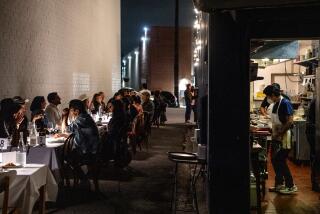Newport Police, Residents Join Up to Turn Off the Tap
- Share via
NEWPORT BEACH — After years on the nightclub circuit, singer-songwriter Mark Wood believed he had found an ideal site to settle down and open his own restaurant with entertainment--at the former building of a famous eatery within Cannery Village.
But now, more than a year later, he has yet to serve his first drink. And some residents couldn’t be happier.
They have joined forces with police like never before to block or impose restrictions on people seeking liquor licenses in this town, home to some of the county’s top nightspots.
Police officers, spurred by an increase in the number of alcohol-related arrests and residents’ complaints about public urination, vandalism and noise, aim to reduce the hours bars and nightclubs serve liquor and beer.
Wood’s proposed restaurant, Mark Wood’s Hide Out, has become a pointed example of how police have been negotiating with individual applicants and conducting public meetings on licenses to gauge acceptance. Before, police would stand on the fringes of the planning process, working primarily with the state Alcoholic Beverage Control agency.
The restaurant industry “obviously hasn’t been able to regulate themselves,” said Police Department spokesman Sgt. John Desmond. “Our approach now is getting involved with the planning process so that [alcohol-related arrests] will not continue to drain our resources.”
About 40% of all arrests in the city are alcohol-related, according to police calculations. That’s about 1,500 arrests out of 3,700 in 1995.
“Resources we could be devoting to other types of crime prevention we have to use arresting drunks in the streets,” Desmond said.
Residents are getting more involved too.
In Wood’s case, neighbors unhappy with his police-negotiated concession to reduce the hours he would serve alcohol went so far as to hire an attorney to protest his permit application, which is under appeal after it was denied earlier this year. The appeal hearing before a state liquor licensing judge will continue in January.
“We have nothing against Mr. Wood,” said village resident and business owner Rose Parvin.
“It’s the chaos that alcohol brings and the over-saturation of alcohol available that we are against.”
Residents hoped that an attorney would have a better chance at convincing the judge that there are enough taverns and liquor-serving restaurants in the area.
Wood’s application is particularly sensitive to the community because of its location, Cannery Village, where the level of complaints about public drinking and alcohol-related crime is most evident, police say. Ten licensed bars, clubs and restaurants operate in the five-block area on the shoulder of the Balboa Peninsula.
More than half of the city’s alcohol-related arrests are made on the peninsula, police said.
“I had no idea there would be this type of opposition,” said Wood, a local resident who is attempting to open his restaurant at the former site of the jazz club Cafe Lido, which also previously housed the well-known Ambrosia restaurant.
Police have directly influenced restrictions on other permits besides Wood’s, and have been involved in the planning phase of about another dozen proposed establishments this year alone.
However, the city’s restaurant industry says the Police Department’s arrest figures are misleading and that the department is overstepping its bounds by getting involved in alcohol-permit policy-making.
Police say the number of arrests correlate to the number of alcohol licenses in an area, and all licensed establishments are responsible for the problem. But Marcheano countered that the reputation of good businesses is being tarnished by the bad.
“In any industry you have bad apples, and that’s who you should concentrate on,” Marcheano said.
“We don’t want sleazebags in here. We don’t want people who go out of their way to get people drunk.”
The association has endorsed Wood’s restaurant, and Wood has promised he won’t draw the rowdy crowd that has rattled residents’ nerves.
But neighbors of the restaurant weren’t so sure.
Last month, they took their complaints to the City Council, prompting Councilwoman Jean H. Watt to request a study on the issue.
Regardless of the outcome of Wood’s application, observers predict the citywide crackdown on alcohol consumption will only increase.
More to Read
Sign up for Essential California
The most important California stories and recommendations in your inbox every morning.
You may occasionally receive promotional content from the Los Angeles Times.













